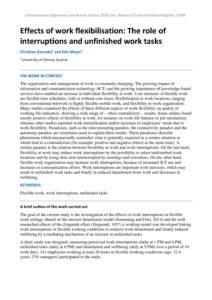| Document | Author Christian Korunka and Edo Meyer |
| Abstract The organisation and management of work is constantly changing. The growing impact of information and communication technology (ICT) and the growing importance of knowledge-based services have enabled an increase in individual flexibility at work. Core elements of flexible work are flexible time schedules, with or without core times, flexibilisation in work locations, ranging from conventional telework to highly flexible mobile work, and flexibility in work organisation. Many studies examined the effects of these different aspects of work flexibility on quality of working life indicators, showing a wide range of – often contradictory – results. Some studies found mostly positive effects of flexibility at work, for instance on work-life balance or job satisfaction, whereas other studies reported work intensification and/or increases in employees’ strain due to work flexibility. Paradoxes, such as the telecommuting paradox, the connectivity paradox and the autonomy paradox are sometimes used to explain these results. These paradoxes describe phenomena which unexpectedly contradict what is generally expected in a certain situation or which lead to a contradiction (for example, positive and negative effects at the same time). A similar paradox is the relation between flexibility at work and work interruptions. On the one hand, flexibility at work may reduce work interruptions by the possibility to select undisturbed work locations and by using time slots uninterrupted by meetings and coworkers. On the other hand, flexible work organisation may increase work interruptions, because of increased ICT use and increases in communication efforts. Work interruptions are important work stressors, which may result in unfinished work tasks and finally in reduced detachment from work and decreases in wellbeing. |

